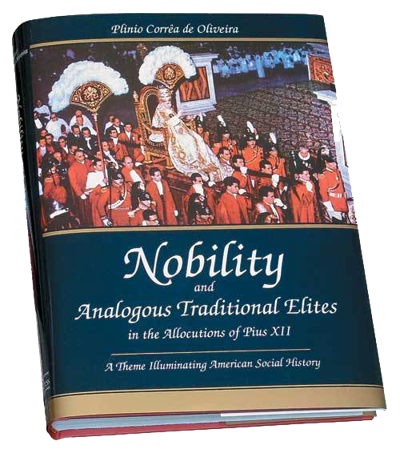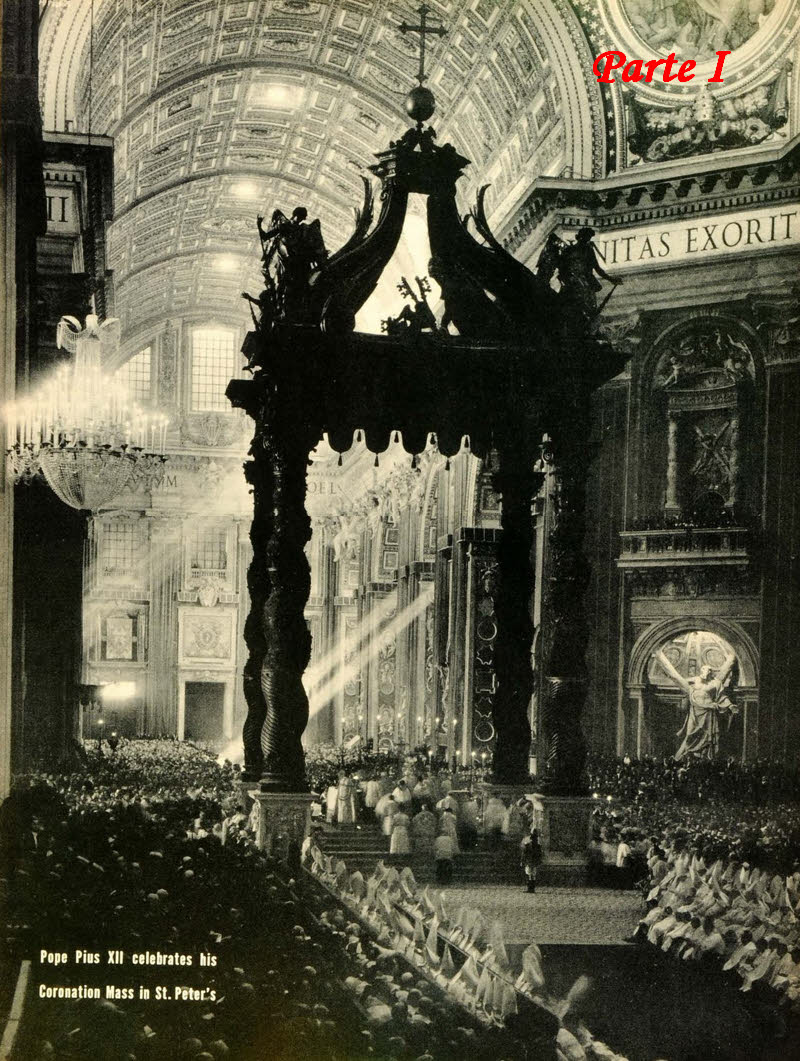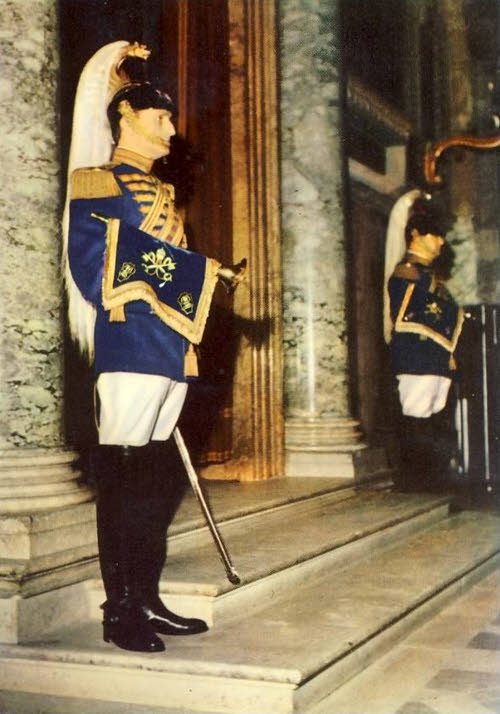Nobility and Analogous Traditional Elites in the Allocutions of Pius XII (by Plinio Corrêa de Oliveira) - Index

Index
Preferential Option: what is it?
To the reader
Chapter I – Unraveling prior objections
1. Without prejudice to a just and ample action in favor of the workers, an opportune action in favor of the elites
2. Nobility: a species within the gender of traditional elites
3. Antinobilistic objections impregnated with the egalitarian spirit of the French Revolution
4. The teachings of Pius XII: a precious shield before the opponents of nobility
5. Intuitive and implicit notions do not suffice – the wealth of concepts with which Pius XII treats the matter
6. Are these allocutions of mere social courtesy, empty of all content, thought and affection?
7. Documents of perennial worth
Chapter II – The situation of the Italian nobility in the Pontificate of Pius XII – The universal scope of the allocutions to the Roman Nobility and Patriciate
1. The situation of the nobility in Italy during the 40's – why focus especially on the Italian nobility?
2. Pius XII and the Roman Nobility
3. The universal scope of the allocutions of Pius XII to the Roman Nobility and Patriciate
Chapter III – People and masses – liberty and equality: genuine and revolutionary concepts in a democratic regime – the teaching of Pius XII
1. The legitimacy and even the necessity for just and proportional inequalities among the social classes
2. People and amorphous multitude: two distinct concepts
3. The inequalities that stem from nature should also exist in a true democracy
4. In a distorted democracy, liberty transforms itself in tyranny and equality degenerates into mechanical leveling
Chapter IV – Nobility in a Christian society – the perennial character of its mission and prestige in the contemporary world – the teaching of Pius XII
1. Clergy, nobility and people
2. The deterioration of the medieval order in Modern Times
3. The nobility should maintain itself as a leading class in the profoundly changed social context of today's world
4. Through a careful adaptation to the modern world the nobility does not disappear in the general leveling
5. In order to match the hopes places in it, the nobility should shine in those gifts that are specific to it
6. Even those who display their spite for the old ways of life, are not totally immune to the shine of the nobility
7. The virtues and specific qualities of the nobles are transmitted to any work they engage in
8. A most elevated example: the couple of royal stock in whose household was born and dwelt the Man-God
9. The highest social function of the nobility: to preserve, defend and spread the Christian teachings contained in the noble traditions that distinguish them
10. The duty of the nobility: not to dilute itself in the anonymity, but, on the contrary, to resist the breath of modern egalitarianism
11. Nobility: a particularly distinguished category in human society – it will have special accounts to render to God
Chapter V – Elites, natural order, family and tradition – aristocratic institutions within democracies – the teaching of Pius XII
1. The formation of elites even in countries without a monarchical or aristocratic past
2. The hereditarity of traditional elites
3. The elites: the propelling force of true progress and the guardians of tradition
4. God's blessing illuminates, protects and caresses all cribs; it does not, however, level them
5. The paternal conception of social superiority
6. Our Lord Jesus Christ consecrated the condition of noble, as well as that of laborer
7. The perennial character of the nobility and traditional elites
8. The law cannot abolish the past
9. Democracy according the social doctrine of the Church – archeologism and false restoration: two extremes to be avoided
10. Highly aristocratic institutions are also necessary in democracies
Chapter VI – Meaningful cooperation of the nobility and traditional elites in the solution of today's crisis – the teaching of Pius XII
1. Christian virtue: the essence of nobility
a) Qualities of soul of a noble today
b) Aristocratic gentlemanism: a link of charity
2. The nobility and traditional elites as guides of society
a) A form of apostolate: to guide society
b) How the nobility should carry out its leading mission
c) The elites with traditional formation have a particularly sharp view of the present
d) The authentically traditional aristocrat: an image of God's Providence
e) Aristocracy's mission with the poor
3. The absent guides – the harm of the absence
a) Absenteeism and omission: the sins of the elites
b) The absence of guides: a virtual complicity
4) Another way to reject one's mission: to allow oneself to corrupt and deteriorate
5) For the common good of society: the preferential option for the nobles in the field of apostolate
Chapter VII – The genesis of nobility – Its mission in the past and today – the ultimate point of Pius XII's insistence
1. The private sphere and the common good
a) The human groups – leaders
* The intellectual requirements for the holder of authority
* The requirements of will and sensibility
* The leader in the exceptional circumstances, both favorable and adverse
* The usefulness and opportuneness of the systematic rendering of these notions
b) The prevalence and nobility of the common good – how it is distinguished from the individual good – private entities whose common good is of a transcendent character whether regional or national
* The importance of entities from the private sphere for the common good of the region, the Nation and the State
* A most peculiar society in the private sphere: the family
c) The Nation and the State are born from the private sphere – the plenitude of the common good
* The formation of nations and regions
* The State as a perfect society – its sovereignty and majesty – its supreme nobility
2. The family in face of the individual, the intermediary groups and the State
a) From the individual to the family, from the latter to the gens and finally to the tribe – the route for the foundation of the civitas – the State is born
b) In the individual and the family, the most essential factors of the common good of the intermediary groups, of the region and of the State – the large family, a small world
c) Families: small worlds that interrelate in a way analogous to nations and States
d) The family and the world of professional or public activities – lineages and professions
e) The lineages form elites even in the most plebeian professional groups or milieus
f) Hierarchical society and as such participative – royal fathers and paternal kings
3. Historical origins of the feudal nobility – genesis of feudalism
a) The class of the landowners become the military nobility as well as the political authority
b) The noble class: a subordinate participation in the royal power
c) The regions define themselves – the regional common good – the lord of the region
d) The medieval king
e) The feudal regime: a factor of union or disunion? – the experience of contemporary federalism
4. The noble and nobility: modelling interaction
a) Genesis – a process based on custom
b) Examples in various fields
5. The absolute monarchy, the hypertrophy of the royalty heading towards the totalitarian and populist State
a) The absolute monarchy absorbs the subordinate bodies and powers
b) It has no alternative but to support itself in civil and military bureaucracies – the heavy "crutches" of the absolute royalty
c) The centralization of power in France
d) The dissolution of the Holy Roman Empire
e) Absolutism in the Iberian Peninsula
f) The super potent bourgeois State – the omnipotent communist State
6. Genesis of the contemporary State
a) The decline of the regions – the journey towards the hypertrophy of the royal power
b) Royal absolutism transforms itself into the absolutism of the State under the democratic representative regime
c) The centripetous pyramidization – the super-pyramidization – two examples: banks and the mass media
d) State capitalism: the continuation of the previous centripetous and authoritarian line – the tomb of everything that preceded it
e) A tomb – two trilogies
f) What remains of the nobility – the answer of Pius XII
7. The moral profile of the medieval noble
a) In war and in peace: the example of perfection
b) The Christian knight – the Christian lady
c) Holocaust, good manners, etiquette and protocol – simplifications and mutilations imposed by the bourgeois world
d) Harmonic diversity in the practice of the evangelical virtues: in the annihilation of oneself in the religious state – in the midst of the grandeurs and splendors of temporal society
e) How not to govern – how to govern
f) The bonum and the pulchrum of the just war – the knights felt this to the depths of their soul
8. The nobility in our days – the magnitude of its contemporary mission
a) The essential substratum of all nobilities, whatever their nationality
b) Nobility: a standard of excellence – an impulse to all forms of elevation and perfection
c) Pius XII's point of ultimate insistence
d) The nobility: yeast, and not mere dust from the past – the priestly mission of the nobility to elevate, purify and pacify the world
e) Admirers of the nobility in the days we live in
f) Nobility: thesis and antithesis
9. The flourishing of analogous elites – contemporary forms of nobility?
a) A matter not dealt with by the Pontiffs: are there "contemporized" forms of nobility?
b) Authentic nobilities, even if of less brilliance – historical examples
c) New wealth, new nobles
d) Are there means in the present political framework to establish new forms of nobility?
e) A new hierarchical step in the social ladder
f) Hopes that the road laid by Pius XII be not forgotten
Conclusion – In the climax of the religious, moral and ideological crisis of today's world: a propitious moment for the action of the nobility and traditional elites
Appendices
Appendix I - In Colonial Brazil, in the Imperial Brazil and in the Republican Brazil: genesis, development and twilight of the "nobility of the land"
A - The formation of elites in Colonial Brazil
1. The first settlers
a) The humble classes
b) The aristocrats and the men of letters
c) The demands of the Faith
2. Genesis and improvement of the initial elites in the settled territory
a) Nobilization through deeds of a military character
b) Nobilization through acts of valor in the pioneering of the territory
c) Nobilization through the lordship over the land and men
d) Nobilization through the exercise of authority in civil and military posts
e) The familiar essence of the elites
3. The "Nobility of the land"
a) Integrating elements and process of formation
b) Characteristics that distinguish it from the European nobility
B - The socio-economic cycles of Brazil and the historical trajectory of the "Nobility of the land"
1. The cycle of the brazilwood and the captaincies
2. The sugar cane cycle
a) The appearance of the plantation lord
b) The ambiences and customs of the plantation lords
c) The military activity of the plantation lords
3. The gold and precious stones cycle
a) "Entradas" and "Bandeiras"
b) The "Bandeiras" and the "Nobility of the land"
4. The "Nobility of the land" in face of the king and the nobility of the metropolis
a) Plantation lord: a condition of nobilizing content
b) The "honorable men," the "good men"
c) Privileges of the "Nobility of the land" – the government of the municipalities
5. A "Brazilian feudalism"
6. The centralization of power and the lessening of the privileges of the "Nobility of the land"
a) The offensive of the legists and the loss of the autonomy of the municipalities
b) The exit of the "Nobility of the land" from the cities to the countryside
7. The moving of the Portuguese Court to Brazil
8. The Empire's titles of nobility
9. The parliamentary Monarchy and the "Nobility of the land"
a) The electoral clans
b) The National Guard and the "Nobility of the land"
10. The coffee cycle
a) The proclamation of the Republic and the rural aristocracy
b) The coffee crisis
c) The revolution of 1930 and the end of the traditional rural elites in Brazil
Appendix II – The revolutionary trilogy Liberty, Equality, Fraternity: various Popes speak
1. Omnimodous absolute liberty and equality: foolish and even monstrous concepts
2. Liberty and Equality spread by the French Revolution: fallacious concepts disseminated by most perfidious philosophers
3. The abuse of Liberty and Equality leads one to socialism and communism
4. Christian equality "does not suppress every difference among men, but makes of the variety of the conditions and duties of life an admirable harmony and a kind of concert"
5. A philosophy the Church is far from rejoicing over
6. The revolutionary principles of 1789 contained the summation of all the teachings of the false prophets
7. Christian concepts that had assumed an antiChristian, laicist and irreligious banner
8. Deep down, they were Christian ideas; but those who first formulated them made no reference to the alliance between man and God
9. An historical movement that found itself swept away by an impetuous wave of violence and religious hatred
Appendix III – The forms of government under the light of the Social Doctrine of the Church: in thesis – in concreto
A - Pontifical and other texts on the forms of government: monarchical, aristocratic and democratic
1. The monarchical regime: the best form of government
2. The Church is not opposed to any form of government that is just and tenders to the common good
3. This or that other form of government may be preferable, given that it adapts itself better to the character or the customs of the people for which it is destined
4. The error of the Sillon: only democracy will inaugurate the reign of perfect justice
5. The Catholic Church finds no difficulty in adjusting itself with the various forms of government
6. True democracy is not incompatible with monarchy
7. The Catholic Church accepts any form of government so long as it does not oppose divine and human rights
8. To determine the political structure of a country it is necessary to take into consideration the circumstances of each people
9. The Church does not manifest any preference for political systems or institutional solutions
10. The fundamental structure of the political community, a fruit of the genius of each people and the march of its history
11. The monarchy is in itself the best regime, for it is the one which more easily favors peace
12. The best way to moderate and fortify the monarchy is to surround it with aristocracy and democracy
13. A democratic Constitution should assume and protect the values of the Christian Faith, without which it will not be able to survive
B - Forms of government: abstract principles and their influence in the formation of a political mentality
1. The concrete usefulness of the abstract principles
2. The position of the Catholics in face of the forms of government
3. Socio-cultural projection of the aristocratic-monarchical political mentality
4. The legitimacy of the anti-egalitarian principles
5. Reflections of the political mentality over the intermediary social groups
C - The French Revolution: prototypical model of a revolutionary republic
1. The Revolution in its essential elements
a) An impulse at the service of an ideology
b) One more element of the Revolution: its multitudinarian character
2. The opinion of the Catholics in face of the French Revolution: dissensions
a) Differing ways for Catholics to consider the French Revolution
b) The French Revolution seen by Pius VI
c) Connivances of the "moderates" with the radicality of the Revolution
3. Leo XIII intervenes
Appendix IV – Aristocracy in the thoughts of a controversial, but unsuspected Cardinal of the XXth century
1. Philosophical sense
2. Theological sense
3. The Christian public rights
4. Social aristocracy
5. Aristocracy in the family
6. Political aristocracy
7. Contemporary social mission of the aristocracy
8. The new aristocracy
Documents
Documents I – Allocutions of Pius XII to the Roman Nobility and Patritiate
Allocution of January 8, 1940
Allocution of January 5, 1941
Allocution of January 5, 1942
Allocution of January 11, 1943
Allocution of January 19, 1944
Allocution of January 14, 1945
Allocution of January 16, 1946
Allocution of January 8, 1947
Allocution of January 14, 1948
Allocution of January 15, 1949
Allocution of January 12, 1950
Allocution of January 11, 1951
Allocution of January 14, 1952
Allocution of January 9, 1958
Documents II – Allocution of Benedict XV to the Roman Nobility and Patritiate of January 5, 1920
Documents III – Special duties of society towards the impoverished nobility
1. The best alms is that given to the impoverished noble
2. Solicitude of Queen Saint Elizabeth towards the impoverished nobility
Documents IV – Noble stock is a precious gift from God
1. Nobility is a gift from God
2. Our Lord Jesus Christ wanted to be born a noble; He Himself loved the aristocracy
3. Nobility by birth seems to be a fortuitous fact, but it results from a benevolent design from Heaven
4. Jesus Christ wished to be born of royal race
5. Our Lord Jesus Christ wished to be born poor, but wanted also to have a distinguished relationship with the aristocracy
6. Mary, Joseph and, therefore, Jesus, were born of royal stock
7. God the Son wished to be born of royal stock in order to gather in His Person every kind of grandeur
8. Nobility of blood is a powerful stimulus for the practice of virtue
9. The power exherted by our stock over our actions is extensive
Documents V – The doctrine of the Church on social inequalities
1. The inequality of rights and power stems from the Author of nature Himself
2. The Universe, the Church and civil society reflect the love of God in an organic inequality
3. The sectarians of socialism declare that the right to property is a human invention that causes repulse to the natural equality among men
4. Nothing causes more repulse to reason than a mathematical equality among men
5. Inequalities are a condition for social organicity
6. Social inequality is of benefit to all
7. Just as in the human body the various members adjust themselves to each other, in the same way the social classes should integrate themselves in society
8. The Church loves all classes and the harmonious inequality among them
9. Society should have princes and vassals, employers and proletarians, wealthy and poor, wise and ignorant, nobles and plebeians
10. Some democracies go to such degree of perversity as to attribute the sovereignty in society to the people and strive to suppress and level all classes
11. Jesus Christ did not teach a chimerical equality nor disrespect for authority
12. It isn't because they are equal by nature that men should occupy the same station in social life
13. The fraternal treatment between superiors and inferiors should not obliterate the variety of conditions and the diversity of the social classes
14. To love the social hierarchy, for the greater good of both individuals and society
15. One should not excite animosity against the wealthy inciting the masses to an inversion of the order in society
16. The inequality of rights is legitimate
17. The similarities and differences among men find their proper position in the absolute order of being
18. The interrelationship of men produces always and necessarily a scale of ranks and differences
19. To establish the absolute equality is to destroy the social organism
20. Whoever dares deny the diversity of social classes contradicts the very order of nature
21. A society without classes: a dangerous utopia
22. The inequality among creatures is a condition for Creation to give glory to God
23. The suppression of inequalities is a condition sine qua non for the elimination of religion
24. By nature, in one line all men are equal, but in another they are unequal
Documents VI – The necessary harmony between authentic tradition and authentic progress
1. The people's true friends are traditionalists
2. Respect for tradition absolutely does not impede true progress
3. One of the most frequent and most grave defects of modern sociology lies in underestimating tradition
4. The detaching of oneself from the past: a cause of uneasiness, anxiety and instability
5. Tradition is a fertile patrimony, it is an inheritance that must be preserved
Documents VII – Ancient Rome: a State born from patriarchal societies
1. The word pater is distinct from genitor and appears as a synonym for the word rex
2. The gens of the Romans and the génos of the Greeks
3. The concept of family in the ancient world
4. Family, cúria or frátria and tribe
5. The city is formed
6. City and urbs
7. The difficulty in forming the State
Documents VIII – Feudalism: fruit of the medieval family
Documents IX – The familiar character of feudal government – the king: the father of his people
1. Brief biographical features
2. Pátria: the father's domain
Documents X – The paternal character of the traditional Monarchy
1. Francis I's welcome in Vienna after the withdrawal of Napoleon's troops
2. The welcome bestowed by the people of Paris on the Count of Artois upon his return from exile
Documents XI – What Popes, Saints, Doctors and Theologians think about the licitness of war
1. The legitimate purpose of war is peace in justice
2. Popes and Councils confirm the doctrine of St. Thomas on war
3. To die or to kill for Christ is not criminal, but glorious
4. To protect the Faith is reason sufficient for the licitness of the war
5. Sacred Scriptures praises the wars against the enemies of the Faith
6. The Church has the right and the power to convoke and lead a Crusade
Documents XII – Is being noble and leading the life of a noble incompatible with sanctity?
Next







